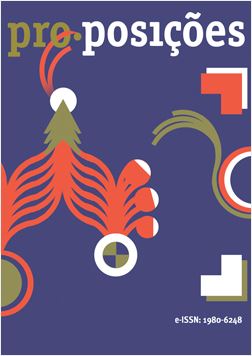Abstract
Based on data by researchers at the University of Warwick (UK), which indicate a positive relationship between Facebook use and the increase in attacks against refugees in Germany, the aim of this article is to establish a reference for understanding the functioning of social networks and their mediation role in the production and intensification of violence relations. This work resumes elements of the works of Theodor Adorno, Max Horkheimer, and Herbert Marcuse guided by the hypothesis of the existence of an ongoing forgetfulness in the social mediation organization. Instead of defending what would be a fair humanity, principles that keep barbarism as an active order are updated.
References
Adorno, T. W. (2009). Dialética negativa Zahar.
Adorno, T. W. (2015). Ensaios sobre psicologia social e psicanálise Editora Unesp.
Adorno, T. W. (1993). Minima moralia: Reflexões a partir da vida danificada Ática.
Adorno, T. W. (1995a). O que significa elaborar o passado. In T. W. Adorno. Educação e emancipação (pp. 29-49). Paz e Terra.
Adorno, T. W. (1995b). Palavras e Sinais: Modelos críticos Vozes.
Adorno, T. W. (2010). Teoria da semiformação. In Bruno Pucci, Antonio A. S. Zuin, & Luiz A. Calmon Nabuco Lastória, Teoria Crítica e inconformismo: Novas perspectivas de pesquisa (pp. 7-40). Autores Associados.
Adorno, T. W., & Horkheimer, M. (2006). Dialética do esclarecimento Zahar.
Antunes, D., & Maia, A. (2018). Big data, exploração ubíqua e propaganda dirigida: novas facetas da indústria cultural. Psicologia USP, 29(2), 189-199. http://dx.doi.org/10.1590/0103-656420170156
Benjamin, W. (2012). Magia e técnica, arte e política: Ensaios sobre literatura e história da cultura Brasiliense.
Boyd, D. M., & Ellison, N. B. (2018). Social Network Sites: definition, history and scholarship. Journal of computer-mediated communication, 13, 210-230. Disponível em: https://onlinelibrary.wiley.com/doi/epdf/10.1111/j.1083-6101.2007.00393.x
Kosinski, M., Stillwel, D., & Graepel, T. (2013). Private traits and attributes are predictable from digital records of human behavior. PNAS, 110(15), 5802-5805. Disponível em: http://www.pnas.org/cgi/doi/10.1073/pnas.1218772110
Lambiotte, R., & Kosinski, M. (2014). Tracking the digital footprints of personality. Proceedings of the IEEE, 102(12), 1934-1939. https://doi.org/10.1109/JPROC.014.2359054
Lash, S., & Lury, C. (2007) Global culture industry: The mediation of things Polity.
Lévy, P. (1996). O Que é Virtual? Editora 34.
Marcuse, H. (1979). A ideologia da sociedade industrial Zahar.
Marcuse, H. (1998). Industrialização e capitalismo na obra de Max Weber. In H. Marcuse, Cultura e sociedade (pp. 113-136). Paz e Terra.
Marcuse, H. (1999). Tecnologia, guerra e fascismo Editora Unesp.
Morozov, E. (2018). Big Tech: a ascensão dos dados e a morte da política Ubu, 2018.
Morozov, E. (2019). Capitalism’s New Clothes. The Bafler. Disponível em: https://thebaffler.com/latest/capitalisms-new-clothes-morozov
Müller, K., & Schwarz, C. (2018). Fanning the flames of hate: Social media and hate crime SSRN Electronic Journal http://dx.doi.org/10.2139/ssrn.3082972
Recuero, R. C. (2005). Comunidades virtuais em redes sociais na internet: uma proposta de estudo. E-Compós, 4. https://doi.org/10.30962/ec.57
Sancho, G. R. (2018). Multidões conectadas e movimentos sociais: dos zapatistas e do hacktivismo à tomada das ruas e das redes. In: F. Bruno, B. Cardoso, M. Kanashiro, L. Guilhon, & L. Melgaço, Tecnopolíticas da vigilância: Perspectivas da margem (pp. 355- 375). Boitempo.
Türcke, C. (2010). Sociedade excitada: Filosofia da sensação Editora Unicamp.

This work is licensed under a Creative Commons Attribution 4.0 International License.
Copyright (c) 2022 Pro-Posições


